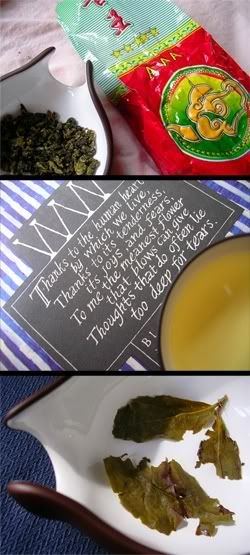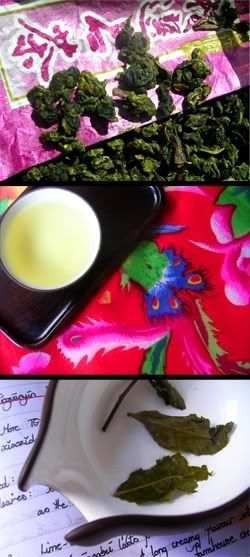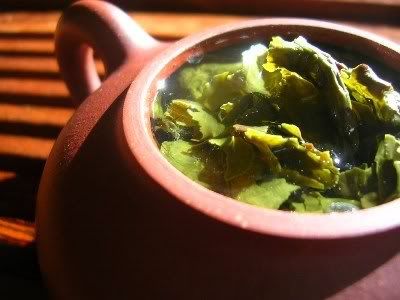
In the spirit of our fortunately verdant surroundings, we have been enjoying various tieguanyin so kindly provided by Chabei's JMcM [see earlier]. Today's notes comprise two of our favourite encounters.
Brewing parameters for both:
Brita-filtered water @ 90C in 10cl tieguanyin pot; ~6-7g leaf; 1 rinse
2007 Tieguanyin "Dahongdai"
 Of course, dahongdai [big red bag] is our ad hoc label for this nameless tea, and not a real leaf name.
Of course, dahongdai [big red bag] is our ad hoc label for this nameless tea, and not a real leaf name.Dry leaf:
Very green; generally smaller, single-leaf balls, with some larger indicating the presence of several leaves within. "A more grass-like aroma."
7s, 7s, 12s, 20s, 30s, 45s, 75s, 90s:
"The flavour is just like honey." Sweet it is, but more gradual and gentle than the previous "Dajindai".
"Amazing - a very strong orchid taste in the mouth." Trying to find some orchid in it, I reply, "What is it with Chinese people and orchids? Do you eat flowers?"
As ever, the soup starts out lightly green, and then includes a yellow hue as the basic leaf begins to assert itself, accompanied by a corresponding sourness in the flavour.
The scent is constantly beautiful throughout the long life of this tea, unlike even the most expensive Taiwanese gaoshan wulong we have encountered in the past, which seem so ephemeral in comparison.
Wet leaves:
Large, feeling healthy and strong without being tough. Edge-damaged for oxidation.
Overall:
An orchid tea, but classically tieguanyin. The endurance is noteworthy. Another good tea from JMcM.
2007 Tieguanyin "Xiaozidai"
 Xiaozidai is "little purple bag", in this case.
Xiaozidai is "little purple bag", in this case.Dry leaf:
Seriously large balls of tea. One good aspect of this sized ball is that there are less likely to be small, fragmented leaves within.
7s, 7s, 12s, 18s, 25s, 45s, 70s, >90s, >180s:
The soup looks like lime cordial, being translucent and green. "The leaves smell super-green!"
The wenxiangbei lasts for whole minutes, and is a big, bold sweetness. A long, creamy flavour sits in the mouth - just like a serious farmhouse cream. This is less about being floral in the nose.
In the second infusion, and for the remainder, a solid, nutty flavour comes to the fore, and it takes on a certain "rock-like" quality of yancha [rock tea], with its mineral, charcoal edge.
"It tastes more and more roasted." Though the roast is not dominating, the way a brashly roasted Wuyi yancha might be, it becomes stronger and more noticeable - fortunately not pushing the wulong flavour out too far.
Wet leaves:
The leaves are bursting to escape their small volume. They are 3cm whole leaves, with a few stems. It is a decent grade, if not the finest, but no sign of the unorthodox roasting can be seen in the leaves.
Overall:
A curiosity indeed, being a pleasant wulong sent more to the yancha "Dark Side", without being "nongxiang".
A ceaseless writer of Haiku, some more Zen than others, this one was part of the recent 114 that I wrote when in south-west China, and fits the mood well:
Curling white mists -
Morning tea in a sunbeam
The scent of flowers
Morning tea in a sunbeam
The scent of flowers


8 comments:
"What is it with Chinese people and orchids? Do you eat flowers?"
My thoughts exactly! I'm glad I'm not the only one who doesn't know what orchids taste like. :)
As always, this was a good read. Thanks again!
-Brent
Edible flowers I know of (and sometimes include in salads when I find them growing) include: daylillies, violets, nasturtiums, chrysanthemums. A search on "edible orchids" shows that most kinds are edible, though not particularly tasty (news to me who thought most orchids were poisonous). Of course it is the smell, and not the taste that is being compared, but you knew that.
It reminds me of people that say "Mmm, this tastes just like washing powder."
How... do... you... know?!
Then again, both Davelcorp (or was it Mike?) and I found "male urine" in MarshalN's 2003 Quanji Bulang (when overbrewed), so perhaps I shouldn't make too much noise...
Toodlepip,
Hobbes
Actually, nearly everyone knows what one kind of orchid tastes like- Real Vanilla is a product of the Vanilla orchid. Vanilla extract is made from the seed and pods, but the flowers also smell like vanilla.
Male urine? Does female urine taste different (better)? Hobbes!!!
EAnglin,
I was not aware that vanilla was an orchid! I've been known to chew the heads of daisies, but that's about my limit in terms of chewing flora. :)
MarshalN,
Hah! I laughed aloud...
(Actually, remembering back to school biology, I recall that male urine has more ammonia in it - that's got to affect the bouquet.)
Toodlepip both,
Hobbes
On a similar note, I had my first Lychee fruit a few days ago. Now I get it...
-Ian
Lychee... one of the previously-familiar words that, I recently found out, is a transliteration into English from the original Chinese: it's "lizhi"! I was so familiar with the word, that I didn't think to question its origins. Live and learn. :)
Toodlepip,
Hobbes
Post a Comment